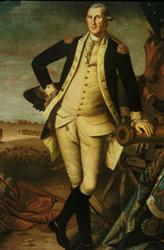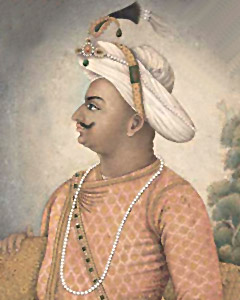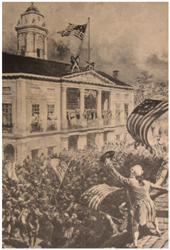Intense Anglo-American War.
George Washington Commander-in Chief.
Hyder Ali passed away.
Tippu continues the war.
America becomes independent.
Tippu to Malabar.

1790
The Dutch Sells Off the Fort.
An Enraged Tippu
Exactly one year prior to the Boston Tea Party (1772), Warren Hastings, who had been once Governor in India, became Governor General of India. When he was racking his brains to emasculate the unruly Sikhs and the Marathas, the war between England and America was raging.

George Washington was selected as one man, by the Americans, as the Commander-in Chief at the Second Continental Congress held in Philadelphia. Under his leadership the Americans fought against British unitedly. At the Second American Congress held in 1776, the Declaration of Independence became an important historical event. Give freedom or give administration became the slogan that echoed throughout America. An enthusiastic crowd crumbled the statue of George II installed in New York. While Warren Hastings was trying his level best to stabilise the British rule in India, America was being lost for the British. Warren Hastings was pestered at the good relations between the French and Mysore making use of the opportunity emanated from the war between England and France the French in India tried to regain the territories once lost to the English. But when the two powers clashed Hyder Ali helped the French. Hyder Ali was miffed at Mahi being attacked by the English and at the troop movement of the English through it. He declared war on the English making mention of it. He also entered Carnatic and attacked Arcot. But the events that took place later turned against him.
The American war was going on. Whatever might be the attempt of the British, it became impossible for them to crush the Americans or their army led by George Washington. Hemmed in by opposing forces Lord Cornwallis, the British Commander-in-Chief surrendered before the Americans in 1781.
It is only later dawned upon that Hyder Ali was at war with the English carrying himself with a serious ailment. In 1782 he passed away. Then his son Tippu Sultan pursued the war against the English who later understood that the son was a greater war strategist than the father.
Britain accepted the naked truth at the last movement that there was no other way out than to give freedom to the American people who could not be suppressed or defeated in war. In 1783, the English granted freedom to the American people accepting their supremacy. And thus a new nation, the United States of America (the USA) found its place in the world map.

With the death of Hyder Ali the British forces captured the fort of Palghat at the time when he went to Mysore. The strip of land of Malabar up to Korappuzha was captured. Coming to know of it Tippu Sultan returned immediately. The English blocked the movement of Tippu at Tellichery and by Treaty of Mangalapuram signed in 1784 the war came to an end. The lost territories were restored and thus Malabar came under the supremacy of Tippu. After signing over a treaty with Marathas and the Nizam Tippu was making preparations to move to Malabar. In the meanwhile Lord Cornvallis who ate humble pie in America came to India as the Governor General. In south India he understood, the formidable power would be Tippu. He took a decision to put an end to the growing power of Tippu in alliance with the French. But Tippu had in mind to put in to practice certain changes in the domains of society and administration in Malabar and he would start the journey with that end in view. He had strong disenchantment against certain social evils prevalent there.
Tippu reached Malabar through the Thamarassery Pass of Wayanad in 1789, the year in which George Washington became the first president of America setting into motion the democratic republic in America.

America
The Mysore administrator's arrival made the kings and people of Malabar affrighted and the declarations he made, aimed at social changes, gave wrong message to the people. Coloured stories were spread on religious conversion and plunder of Hindu temples. With this, people, inclusive of petty kings and chieftains, fled en masse to distant places. Most of the people reached in Travancore where King Rama Varma provided refuge to all. For many reasons Tippu had more vengeance to King of Travancore who, like other kings of Malabar, found a deliverer in the English, while the English East India Company was waiting for an opportunity to confront Tippu employing deception and strategies .The Company, coming to know that the foe is not a cipher, was in weighing options. After attending the nuptial ceremony of his son, Abdul khali's wedding with the daughter of Arakkal Beevi,Tippu conquered some territories of Kolathiri and having handed over them to Kolathiri, he went to Chavakkad by the sea-shore. From there he went to Coimbatore.
Karthika Thirunal Rama Verma, the Raja of Travancore understood that at any moment Tippu might attack his territory .In tune with the request of the Travancore the English stationed a small group of soldiers near the fort of Azhikodu. The British in the meanwhile appointed an official named Powney to communicate between Travancore and the British government. Estimating that Tippu's invasion would be through the route of Cranganore the Travancore Dewan Raja Keshavadas reached Cochin and met the Dutch Governor there. In the discussion later held Travancore decided to purchase from the Dutch the fort of Cranganore (Kottapuram) and the fort of Pallipuram (Aykotta). In July 1789 the title deed was prepared. As the Dutch made it out that Tippu would conquer this fort, they decided to sell it off to Travancore. The English too was in favour of the sale. Besides the forts the fields and the gardens around them cannons gun powder and all the weapons were included in the sale. It was decided that 50000 Surat silver rupees were to be handed over to the Dutch immediately. For the remaining Rs 250000/- the payment should on instalment basis. The buildings at Palliport, where the lepers dwell along with fields near them, were exempted from the sale. They were kept under the direct control of the Dutch East India Company. In 1789 July the parties concerned signed over the sale deed documents with Powney as the witness.
The Dutch later vacated the fort and it enraged Tippu. The Raja of Cochin too complained that without his permission the forts should not have been exchanged. On October 1789, with 20000 soldiers, 10000 spear-bearing troops, 50000 cavalry men and 20 cannons, Tippu came over the territories of Cochin. His plan of attack was centred on the town of Trichur.Cochin already accepted the suzerainty of Mysore and so naturally his ire and vengeance were all against Travancore which was given ultimatum by him whose terms were that it should surrender the forts and the places it purchased from the Dutch, hand over the kings and chieftains of Malabar who were given shelter in Travancore, demolish the wall that was built for protection of Travancore against the advancing troops of Tippu and so on. But Karthika Thirunal Rama Varma rejected these terms and war became inevitable. With 7000 soldiers Tippu attacked the heavy fort. And as he was able to storm in to it, the forces of Travancore fled away from the scene. Coming to know the news Karthika Thirunal was shocked and he sought for help from the English requesting their interference in the war, blocking the movement of Tippu. Mysore army having seized the fort of Cranganore, fort of Ayi, and the places of Alangad and Paravur reached up to Alwaye. But at this time the monsoon became intense and it prevented the troop movement. In the meanwhile, Kesavadas, the Dewan, got a secret message from the English that they were going to attack Tippu. Lord Cornwallis forging an alliance with the Nizam and Marathas declared war on Tippu, as a consequent of which third Anglo-Mysore war started in 1790. Tippu, then withdrawing the forces from Kerala went to Mysore through Coimbatore. Thus Travancore narrowly escaped from the war. There was going to be fierce fighting between the English and Tippu.